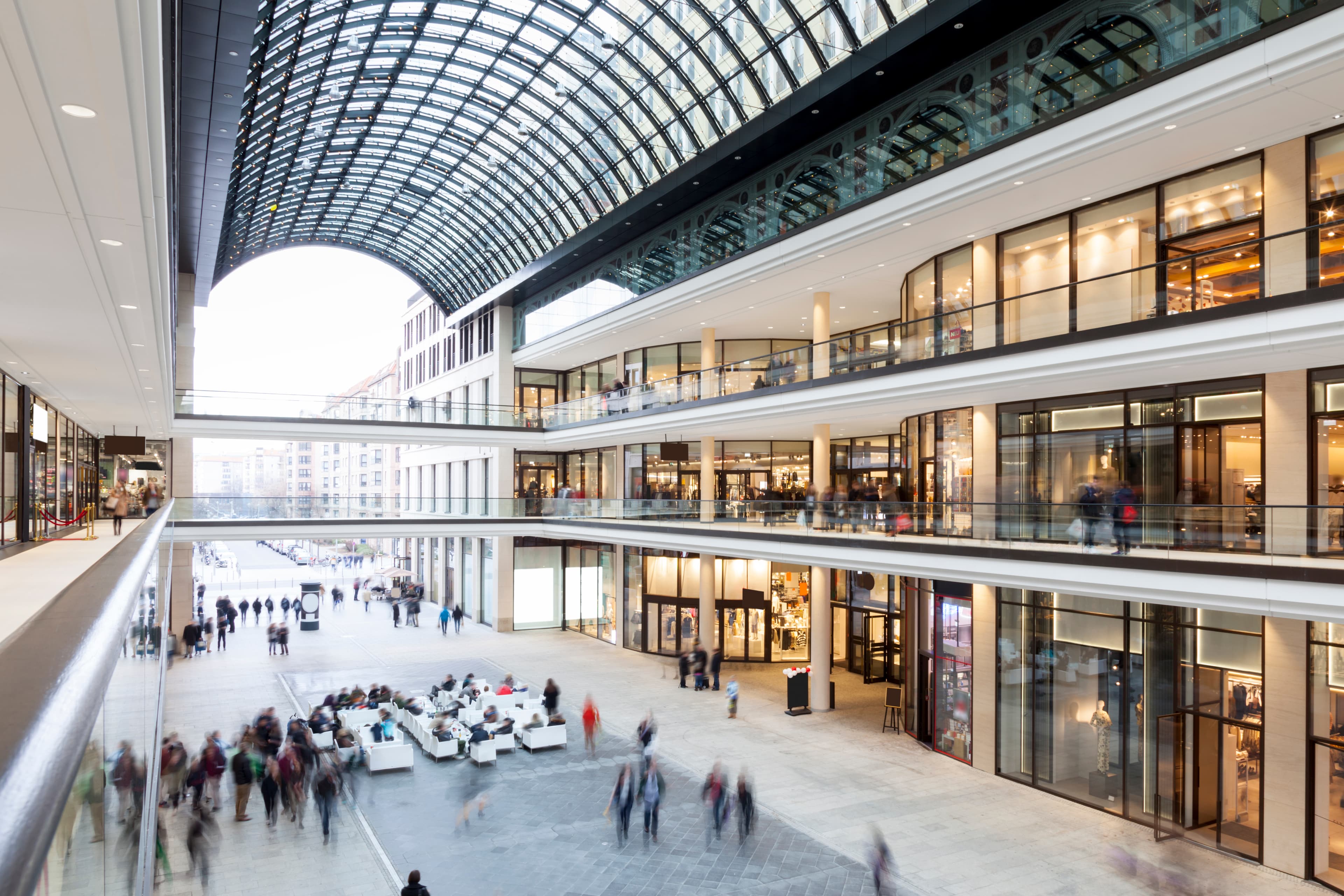Vancouver commercial real estate market update – Q1 2025
Our quarterly update on Vancouver's commercial real estate market, including overall cap rates and notable property transactions across asset classes.

Key highlights
Vancouver demonstrated resilience in 2025, with $2 billion in dollar volume transacted, a 10% increase year-over-year
The office and retail sectors tied with the highest year-over-year percentage growth, both up 140%
The land sector recorded $705 million in dollar volume transacted, a 3% decrease year-over-year
The multifamily sector slowed amidst shifting development focus, with $297 million in dollar volume transacted, down 10% year-over-year
The industrial sector recorded $435 million in dollar volume transacted, down 19% year-over-year, as conditions eased with availability rates climbing to 6.0%, the highest since 2010
Vancouver proved to be a resilient market, as investment volume increased by 10% year-over-year
Vancouver’s commercial real estate market experienced an uptick in investment activity during the first quarter of 2025, with a total investment volume of $2 billion, representing a 10% year-over-year increase. While macroeconomic uncertainty, shifting trade policies and evolving consumer behaviours shaped investment activity and development strategies across all primary sectors, Vancouver’s underlying appeal to investors remained strong. This is evidenced by its latest ascent to the top position in Altus Group’s latest Canadian CRE Investment Trends Survey (ITS) moving up from second place in the preceding quarter.
Figure 1 - Property transactions – All sectors by year

Uncertainty persisted in the industrial sector
The impact of fluctuating trade policies and broader economic uncertainty was particularly evident in Vancouver’s industrial sector during the first quarter of 2025. Investors in this asset class appeared to re-evaluate their space needs and, in many instances, postponed investment decisions while awaiting greater clarity on future trade policies. Consequently, Vancouver’s industrial sector witnessed a significant contraction in investment volume, reaching $435 million, which marked a 19% drop year-over-year. This cautious approach contributed to a notable increase in the industrial availability rate, which, according to Altus Group’s latest Canadian industrial market update, climbed by 180 basis points year-over-year to reach 6.0%, the highest level observed since 2010. Signalling a potential change in the supply-demand balance, this rising availability, coupled with land scarcity and increasing construction costs, appeared to have tempered development activity. In the first quarter, Vancouver saw 507,738 square feet of industrial completions, with 53% of the space available for lease. Moreover, 2.9 million square feet remained under construction, with half already pre-leased. Vancouver recorded its second consecutive quarter of positive net absorption, suggesting continued short-term demand for space despite the slowdown in investment activity. However, the softened economic conditions and ongoing trade tensions raised concerns that absorption might revert to negative territory in subsequent periods. This highlighted the delicate balance the Vancouver industrial market was navigating, where strong underlying fundamentals were being tested by macroeconomic and geopolitical uncertainties.
Plateau in land sector activity amidst diverging trends
The land sector experienced a plateau in activity, with investment volume reaching nearly $705 million, representing a 3% decrease year-over-year. A closer look at the sub-sectors revealed diverging trends. The ICI land sector recorded $447 million in dollar volume transacted, marking a substantial 46% year-over-year increase. Conversely, the residential land sector saw a downturn, with $258 million in dollar volume transacted, reflecting a 38% year-over-year decrease. The residential sector observed a marked softening compared to historical averages, indicating a shift in market sentiment and activity. This moderation in transactional pace was largely attributed to a combination of challenging economic conditions and changes to immigration policies that have introduced considerable caution into developers’ land acquisition strategies. Key among these challenges are the limited availability of new, appropriately zoned land and the high asking prices for existing parcels. These difficulties were further exacerbated by persistently high construction expenses, ongoing shortages of skilled labour within the construction industry, and the escalating burden of municipal development fees. Under these circumstances, developers had adjusted towards a more conservative and selective strategy for land acquisition, prioritizing investments that exhibited robust fundamentals and lower risk in the existing market. However, ICI land sales have bucked this trend despite the underlying challenges, an indication of sustained investor confidence in the long-term growth potential of industrial and commercial sectors, driven by factors such as the region’s limited supply and demand for warehousing and logistics space.
Multifamily sector slowed amongst shifting development focus
Vancouver’s multifamily sector experienced a notable slowdown, with investment volume reaching nearly $297 million, marking a 10% year-over-year decrease. This contraction in investment activity can be primarily attributed to a combination of factors, including moderating economic growth and dampened investor sentiment stemming from the ongoing geopolitical tensions. While construction activity showed initial signs of picking up, supported by government initiatives and more favourable financing conditions, the market faced challenges in absorbing newly constructed condominium units. Pricing sensitivities and a lack of robust pre-sale activity prompted developers to re-evaluate their strategies and, in many cases, pause new condominium developments. In response to these market dynamics, a discernible shift in development focus towards purpose-built rental properties has emerged. Developers increasingly recognized the strong underlying long-term fundamentals of this segment, driven by consistent demand. Furthermore, the observed deceleration in residential land transactions foreshadowed a future moderation in multifamily construction starts. Looking ahead, the changes in immigration policy represented another key factor that could significantly influence housing demand within the Vancouver market.
Office market showed underlying strength despite high availability
Although Vancouver’s office availability rate remained stubbornly high at 12.4% - a mere 10 basis point decrease year-over-year, as reported in Altus Group’s latest Canadian office market update – the city’s office market displayed underlying strength. Renewed investor optimism, undeterred by the geopolitical uncertainty and spurred by declining interest rates, contributed to a significant 140% year-over-year increase in dollar volume to $233 million, with Class-A properties dominating sales. The ongoing “flight-to-quality” was demonstrated by seven consecutive quarters of positive absorption and the gradually decreasing availability for Class-A office space, indicating that securing such space would likely become more difficult as the pipeline for new Class-A developments dwindled. Meanwhile, construction activity remained subdued in the first quarter, with only one fully-leased mixed-use industrial and office building, Marine Landing – Building B, adding 58,851 square feet of office space. At the quarter’s end, nearly 2 million square feet of office space was under construction, with 28% still available for lease.
Retail sector experienced robust growth
Vancouver’s retail investment market experienced robust growth in the first quarter of 2025, with investment volumes reaching nearly $350 million, marking a significant year-over-year increase of 140%. This strong performance was largely fuelled by investor demand for prime retail locations. Notably, Altus Group’s latest Canadian Investment Trends Survey (ITS) ranked food-anchored retail strips in Vancouver as the most preferred product/market combination among investors. This preference reinforced the consistent consumer demand for essential goods and services, positioning these properties as a stable and attractive asset class. However, Vancouver’s retail sector faces a potential headwind with Hudson’s Bay's recent filing for creditor protection on March 7th. The potential closure of its network, many of which are long-standing anchors in Vancouver’s shopping centres, presents a considerable challenge in absorbing the resulting vacant space. This situation evokes memories of the closures of Sears and Target, which collectively created over 35 million square feet of vacant space across Canada. With the limited pool of single tenants capable of filling these large anchor spaces. The departure of Hudson’s Bay will likely compel landlords to explore innovative redevelopment and revitalization strategies for their properties, mirroring their responses to previous major anchor exits and the unfolding retail landscape.
Figure 2 - Property transactions by asset class YTD (Q4 2024 vs. Q1 2025)

Notable transactions for Q1 2025
The following are the notable transactions for the Q1 2025 Vancouver commercial real estate market update:
1111 West Hastings Street, Vancouver (Le Germain Hotel Vancouver) – Office
The sale of 1111 West Hastings Street for $70 million in March highlighted a growing trend of office-to-hotel conversions driven by shifting market conditions. This 12-storey tower in Coal Harbour will be transformed into a 180-room luxury hotel by 2029, a collaborative effort between Germain Hotels and Reliance Properties, with LemayMichaud overseeing the redesign. The building’s elegant corporate modernist architecture and prime location near the convention centre and cruise terminal made it an ideal candidate for high-end hospitality. This conversion reflected broader trends: high vacancy rates in older functionally obsolete office buildings, the increasing adoption of the hybrid work model, and a rising demand for downtown hotel accommodations. This imbalance also prompted a pivot from new office developments to hotel uses in nearby redevelopment projects, such as those at 800-876 Granville Street and 516-534 West Pender Street and 509 Richards Street. This transaction, coupled with recent development activity, signalled a change in urban priorities from traditional office leasing to adaptive reuse and hospitality-focused mixed-use reinvention.
610 Granville Street, Vancouver (Hudson Mall) – Retail
The commercial section of the Hudson, strategically located steps from Granville Station in a high-foot-traffic area, was sold for $89 million in January 2025. Toronto-based Hazelview Investments acquired the properties from Bonnis Properties, a company known for its merchant development model of building to sell rather than hold. Since 2023, Bonnis Properties has divested several new projects and key assets across Vancouver, including 535 Granville Street, 728-796 Main Street, and the Hollywood Theatre and Residences on West Broadway. These sales indicated a calculated rebalancing in response to recent market volatility and elevated interest rates. Despite these divestments, Bonnis was moving forward with larger mixed-use projects, such as the aforementioned 800-876 Granville Street, signalling a move toward long-term development. Meanwhile, Hazelview’s acquisition aligned with current retail investment trends, securing a key position in downtown Vancouver’s retail corridor – a valuable asset for sustained, long-term investment growth.
19888 Willowbrook Drive; 6131 & 6263 200th Street, Langley (Willowbrook Shopping Centre) – Retail
The January 2025 sale of Willowbrook Shopping Centre for nearly $137 million underscored investor confidence in well-leased, large-format retail assets amidst changing commercial real estate dynamics. The property, totalling 193,785 square feet, was fully leased with a strong mix of national and regional brands like Safeway, RBC, and MEC, solidifying its role as a key regional shopping hub in Metro Vancouver. Purchased by Shato Holdings Ltd., led by the Toigo family, the property was conveniently located near the upcoming Surrey-Langley SkyTrain extension. While no redevelopment plans had been combined with municipal support for densification, Shato Holdings Ltd. positioned it as a prime candidate for future mixed-use development. Overall, this transaction reflected a long-term play focusing on retail resilience, urban growth, and transit corridors, highlighting the continued importance of location, tenant mix, and future land-use potential in retail investment decisions.
1310 Monashee Drive, North Vancouver (Capilano University Rental Housing) – Residential land
In January 2025, North Shore developer and construction company Darwin acquired 1310 Monashee Drive for $27 million. This strategic land purchase aimed to deliver much-needed rental housing for Capilano University students. Located on the main campus in North Vancouver, the proposed development featured two six-storey purpose-built rental buildings with a total of 303 units, offering student-focused amenities such as study areas, social spaces, and ground-floor retail. This development was part of a broader initiative to address the University’s growing population, aligning with the Campus Master Plan and complementing the recent CapU Tantalus Student Housing project in expanding on-campus accommodations. With rezoning approved in April 2024 and the development permit application submitted in early 2025, construction was anticipated to begin within one to two years. Known for its local expertise and community-focused values, Darwin was well-positioned to deliver a high-impact, community-integrated housing solution that supported the University’s long-term growth and addressed the demand for more on-campus rental options.
Figure 3 - OCR trends across 4 benchmark asset classes

Looking Ahead: Navigating Vancouver's Evolving Market
Vancouver’s commercial real estate market in the first quarter of 2025 navigated a period of significant adjustments. While macroeconomic uncertainties and geopolitical tensions contributed to decreased investment activity across most sectors. Vancouver’s fundamental strengths, as highlighted by its top ranking in the ITS, pointed to an underlying market resilience. The industrial and multi-family sectors contended with specific headwinds stemming from trade policies, economic conditions and, in the case of industrial, a short-term oversupply, resulting in tempered investor sentiment. In contrast, the office sector showed areas of strength, particularly in Class-A properties, driven by a flight-to-quality trend, while the retail sector experienced significant growth despite the impending challenge of potential store closures at Hudson’s Bay. The market’s trajectory in subsequent quarters will likely depend on the unfolding economic landscape, , the clarity of trade policies, and the adaptability of developers and investors in capitalizing on shifting demand dynamics and emerging opportunities within each asset class.
Want to be notified of our new and relevant CRE content, articles and events?
Authors

Jennifer Nhieu
Senior Research Analyst

Phil Racine
Team Lead
Authors

Jennifer Nhieu
Senior Research Analyst

Phil Racine
Team Lead




